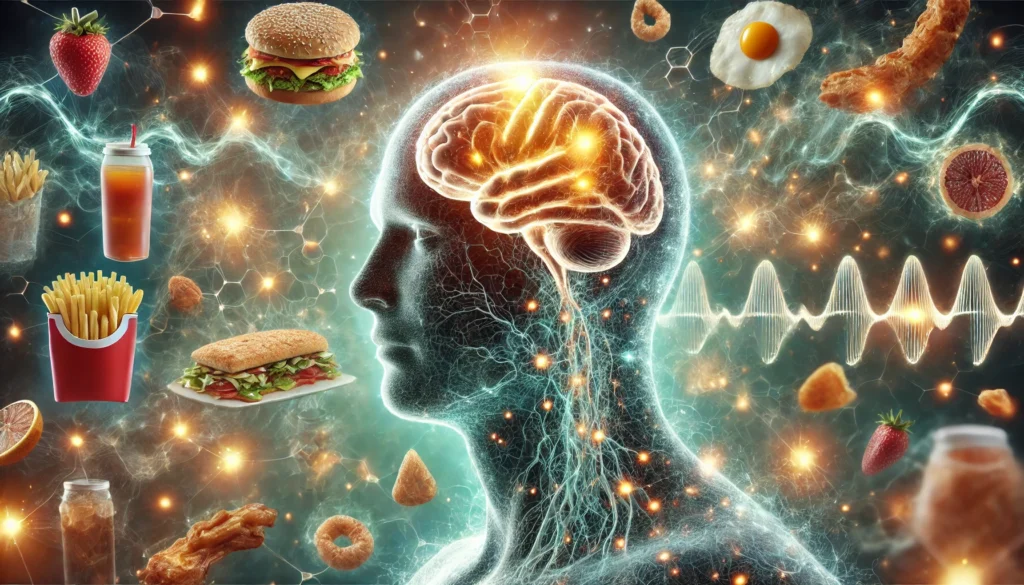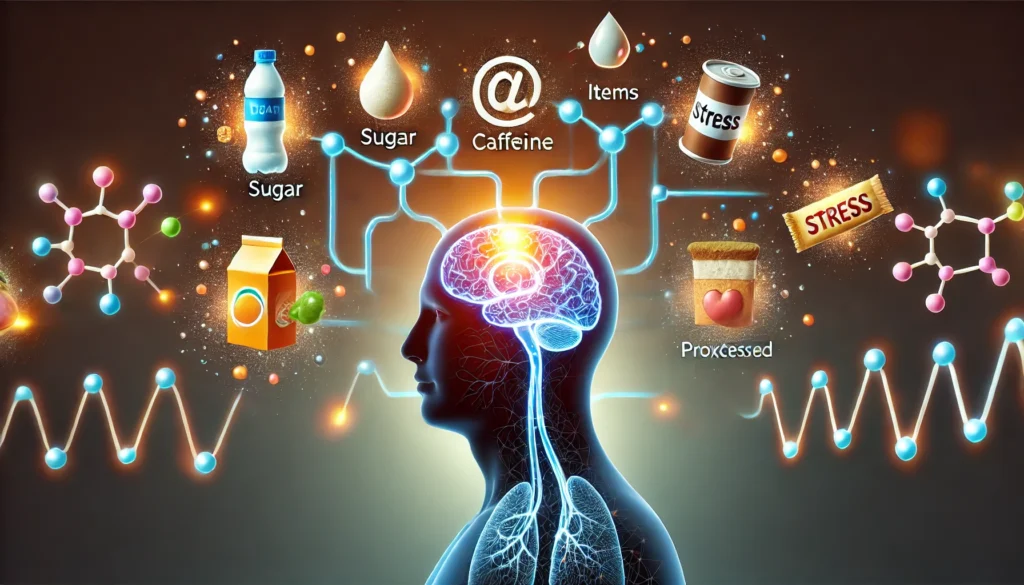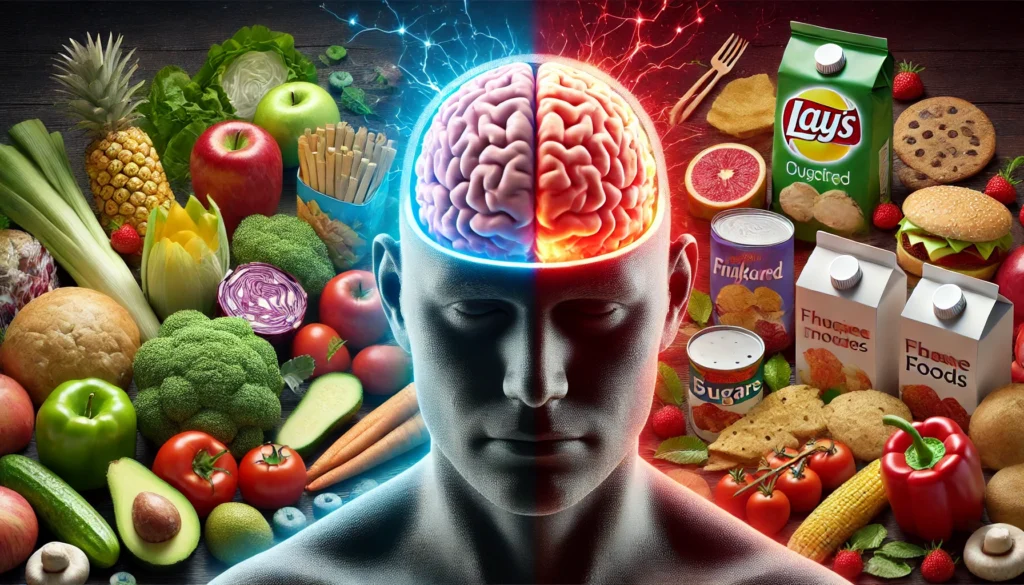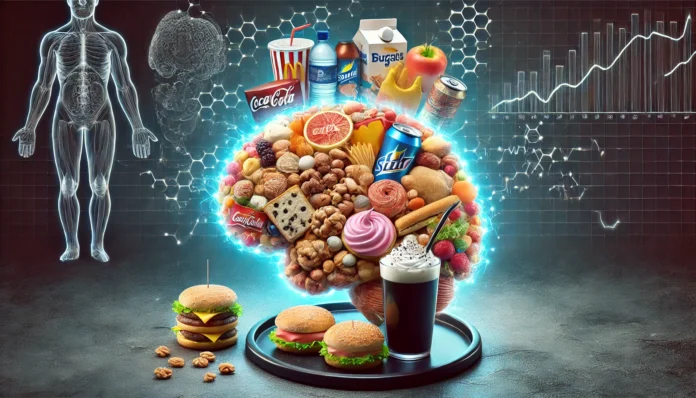Cortisol, often referred to as the body’s primary stress hormone, plays a pivotal role in human physiology, regulating everything from metabolism and immune response to blood pressure and circadian rhythms. Produced in the adrenal glands, this hormone is essential for survival, particularly in situations requiring a rapid stress response. Yet, when cortisol levels remain elevated over extended periods, the consequences for brain health and aging can be profound. Scientific research continues to uncover the far-reaching effects of chronic cortisol exposure, particularly how it accelerates cognitive decline, disrupts memory formation, and increases the risk of neurodegenerative diseases. One of the most controllable factors influencing cortisol levels is diet—a fact that highlights the importance of identifying and understanding cortisol triggering foods.
In recent years, the question “what foods increase cortisol?” has gained traction within both scientific and public health circles. As evidence mounts regarding the long-term cognitive and systemic impacts of high cortisol, consumers and clinicians alike have begun scrutinizing dietary patterns more closely. Understanding which foods may contribute to heightened cortisol production offers not only insights into stress biology but also potential interventions for slowing brain aging, preserving memory, and supporting emotional resilience. From sugary snacks to caffeine-laden beverages, certain dietary components appear to play a significant role in driving cortisol dysregulation, particularly in the context of the modern Western diet.
This article explores the complex interplay between food and cortisol regulation, emphasizing the neurobiological and aging-related consequences of dietary choices. Through a synthesis of current research and expert insights, we examine how specific nutrients and ingredients can serve as cortisol triggers, discuss the implications for cognitive longevity, and offer science-based strategies to mitigate these effects. For those seeking to optimize brain health, improve mood stability, and age more gracefully, recognizing and moderating exposure to cortisol triggering foods is an essential starting point.
You may also like: Best Brain Foods for Focus, Memory, and Longevity: What Science Says
The Science of Cortisol: Stress, Survival, and Brain Vulnerability
Cortisol is a glucocorticoid hormone secreted by the adrenal cortex in response to stress signals, particularly those originating from the hypothalamic-pituitary-adrenal (HPA) axis. In short bursts, cortisol is indispensable. It mobilizes energy stores, enhances alertness, and primes the body to react quickly. However, sustained cortisol elevation has been implicated in a wide array of adverse health outcomes, including insulin resistance, hypertension, osteoporosis, immune suppression, and central to this discussion, neurodegeneration.
Within the brain, cortisol influences key regions such as the hippocampus, amygdala, and prefrontal cortex—structures integral to memory, emotional regulation, and executive functioning. Chronically elevated cortisol levels can lead to atrophy in these regions, impair synaptic plasticity, and reduce neurogenesis, particularly in the hippocampus. Over time, these changes manifest as forgetfulness, emotional instability, and diminished mental clarity. Thus, any behavior or exposure that chronically stimulates cortisol release, including diet, warrants careful examination for its potential to accelerate cognitive aging.
The relationship between food and cortisol production is neither simple nor linear. Cortisol responses to meals are influenced by numerous factors, including macronutrient content, glycemic index, caffeine presence, and even timing. Moreover, the brain’s interpretation of food as either stress-inducing or stress-relieving can itself modulate hormonal outcomes. For instance, certain indulgent foods may trigger reward-related dopamine release while simultaneously promoting cortisol elevation due to their inflammatory or metabolic impact. Therefore, understanding what foods increase cortisol requires a nuanced approach that considers both biochemical triggers and behavioral contexts.
Refined Sugar: A Double-Edged Sword for the Brain and Adrenals
Among the most significant cortisol triggering foods is refined sugar. High-glycemic carbohydrates, especially those devoid of fiber or nutritional value, prompt rapid spikes in blood glucose. In response, insulin is secreted to restore homeostasis. However, frequent surges in insulin can precipitate hypoglycemia, a condition in which blood glucose drops too low. The body perceives this as a stressor, activating the HPA axis and prompting cortisol release to mobilize additional glucose stores. Thus, paradoxically, the consumption of sugary foods often leads to the very stress response people seek to avoid.
Moreover, sugar’s impact extends beyond immediate metabolic responses. Diets high in refined sugars have been linked to systemic inflammation, gut microbiome dysbiosis, and insulin resistance—all of which can exacerbate cortisol dysregulation. For the brain, the consequences can be especially dire. Research has shown that excessive sugar intake impairs hippocampal function, reduces brain-derived neurotrophic factor (BDNF), and accelerates age-related cognitive decline. In aging populations, these changes may compound risks for Alzheimer’s disease and other dementias.
Behavioral aspects of sugar consumption further reinforce its role in stress physiology. Many individuals turn to sugary snacks during periods of emotional strain, reinforcing a feedback loop of cortisol release followed by transient relief, then subsequent energy crashes and renewed cravings. Over time, this cycle can contribute to chronic HPA axis activation, leading to hormonal imbalances that strain both brain and body. Reducing intake of refined sugars, particularly those found in sodas, pastries, and processed snacks, represents a crucial step toward normalizing cortisol rhythms and protecting long-term cognitive function.

Caffeine and Cortisol: The Stimulant-Stress Connection
Caffeine, a widely consumed stimulant found in coffee, tea, energy drinks, and many pre-workout supplements, is another potent driver of cortisol release. While moderate caffeine intake may enhance alertness and short-term performance, its physiological impact on the adrenal system is less benign when consumed excessively or under chronic stress. Caffeine stimulates the central nervous system by antagonizing adenosine receptors, leading to increased dopamine and norepinephrine release. Simultaneously, it triggers the adrenal glands to secrete cortisol, effectively mimicking a stress response.
For individuals already experiencing high stress levels, habitual caffeine use can amplify the body’s sympathetic arousal, leaving little room for restorative parasympathetic activity. The result is often a state of chronic overstimulation, where sleep quality deteriorates, mood becomes unstable, and cognitive performance begins to decline. This is particularly concerning for older adults, whose cortisol clearance tends to slow with age, and whose sleep architecture becomes more fragile. In such populations, caffeine may not only increase cortisol but also prevent its timely decline, leading to sustained elevations throughout the day and night.
The interaction between caffeine and other dietary factors can further modulate its cortisol-inducing effects. For example, consuming caffeine alongside refined carbohydrates may magnify blood sugar fluctuations and exacerbate stress-related hormonal responses. Similarly, using caffeine to compensate for poor sleep or inadequate nutrition may establish a harmful cycle in which the body’s stress systems remain perpetually activated. While complete avoidance of caffeine may not be necessary, mindful consumption—particularly in the afternoon and evening—can help mitigate its impact on cortisol and, by extension, on brain aging.
Processed and Fast Foods: Chronic Stress in a Wrapper
Processed and fast foods constitute a large portion of modern diets, particularly in industrialized nations. These foods are often high in trans fats, sodium, artificial additives, and simple carbohydrates—a combination that not only burdens metabolic systems but also stimulates cortisol production. From a neurobiological perspective, diets rich in processed foods are associated with increased markers of inflammation and oxidative stress, both of which can trigger or exacerbate HPA axis dysregulation.
Many fast foods are engineered to maximize palatability, exploiting the brain’s reward pathways through hyper-concentrated combinations of fat, sugar, and salt. This overstimulation may initially produce pleasurable effects but often results in subsequent crashes, cravings, and mood disturbances. The stress of these physiological fluctuations is not merely anecdotal; studies have demonstrated that high consumption of ultra-processed foods correlates with increased salivary cortisol levels, especially in individuals prone to emotional eating or metabolic syndrome.
Furthermore, the packaging, preparation, and storage of many processed foods introduce additional health hazards. Endocrine-disrupting chemicals such as bisphenol A (BPA) and phthalates, commonly found in plastic containers and food wrappings, can mimic stress hormones or interfere with hormonal signaling. While these compounds do not directly trigger cortisol release, their impact on the endocrine system may heighten sensitivity to stress and contribute to dysregulated hormonal responses.
Choosing whole, minimally processed foods over packaged meals and fast-food options offers a dual benefit: it reduces direct cortisol triggers and supports the brain’s structural and functional integrity. Nutrient-rich diets that prioritize fiber, antioxidants, and essential fatty acids can help buffer stress responses and promote neurogenesis, even in the face of aging-related challenges.

Frequently Asked Questions: Cortisol Triggering Foods and Their Impact on Brain Health and Aging
1. Can eating late at night influence cortisol levels, and if so, how?
Yes, eating late at night can significantly impact cortisol secretion, especially when the meals are high in refined carbohydrates or saturated fats. When we consume cortisol triggering foods close to bedtime, such as sugary desserts or fast food, the body may interpret this as a metabolic stressor. This leads to an increase in cortisol levels during a period when they should naturally be declining to facilitate rest and recovery. Over time, disrupted cortisol rhythms due to late-night eating may interfere with melatonin production and impair sleep architecture, further compounding stress responses the next day. Strategically timing meals to align with circadian rhythms and avoiding foods known to increase cortisol in the evening can support healthier sleep and hormonal balance.
2. How do food allergies or sensitivities relate to cortisol production?
Food allergies and sensitivities act as chronic stressors on the immune system, and their repeated activation can stimulate the hypothalamic-pituitary-adrenal (HPA) axis, thereby increasing cortisol levels. When the body perceives certain foods as threats—gluten, dairy, or soy being common culprits—it mounts an inflammatory response that may elevate cortisol in an attempt to modulate the reaction. In people with unrecognized sensitivities, even seemingly healthy meals can act as cortisol triggering foods. Over time, this cycle may contribute to adrenal fatigue, cognitive fog, and mood imbalances. Identifying and eliminating personal food triggers through elimination diets or functional testing can be an effective strategy for reducing hidden sources of cortisol elevation.
3. Do intermittent fasting or time-restricted eating affect cortisol levels differently depending on the foods consumed during eating windows?
Absolutely. While intermittent fasting can naturally modulate cortisol through improved insulin sensitivity and metabolic regulation, the foods chosen during eating windows can either support or counteract these benefits. If someone breaks their fast with high-sugar or ultra-processed meals, they inadvertently introduce cortisol triggering foods at a time when the body is especially sensitive to metabolic stress. On the other hand, nutrient-dense meals rich in fiber, healthy fats, and antioxidants can blunt cortisol surges and extend the neuroprotective effects of fasting. The timing, quality, and composition of meals matter greatly in determining whether intermittent fasting becomes a tool for hormonal harmony or an amplifier of stress.
4. How do social and emotional eating patterns contribute to chronic cortisol elevation?
Social and emotional eating often involves comfort foods—typically high in sugar, fat, or salt—that fall into the category of cortisol triggering foods. When these foods are consumed in response to stress, loneliness, or anxiety, they may temporarily suppress cortisol through dopamine-driven reward pathways. However, this relief is short-lived and often followed by metabolic and hormonal rebounds that increase cortisol once again. Emotional eating can become a maladaptive feedback loop where psychological stress leads to physiological stress via poor food choices. Mindful eating practices, stress-management techniques, and cognitive behavioral strategies can help break this cycle and prevent cortisol dysregulation from becoming a chronic condition.
5. Are plant-based diets less likely to include foods that increase cortisol?
In general, whole-food, plant-based diets tend to be lower in cortisol triggering foods compared to standard Western diets. These diets emphasize anti-inflammatory ingredients such as leafy greens, legumes, berries, and omega-3-rich seeds, which support adrenal function and reduce oxidative stress. However, not all plant-based foods are benign—high-glycemic processed vegan snacks and meat substitutes high in sodium or additives can still contribute to elevated cortisol. It’s the quality and processing of the food—not just whether it’s plant-based—that determines its hormonal impact. A plant-based approach focused on whole, unrefined foods is far more likely to mitigate than stimulate cortisol production.
6. How do professional athletes or high-performance individuals manage cortisol levels despite consuming some foods that may increase it?
Elite athletes often consume high-protein, high-carb meals that include some cortisol triggering foods to support training and recovery, but they do so within a tightly managed context. They use strategic timing—such as post-exercise nutrient intake—to counterbalance cortisol spikes naturally induced by intense physical activity. Additionally, they rely on micronutrient support, hydration, sleep optimization, and sometimes adaptogens or medical supervision to keep cortisol within a functional range. In contrast to the general population, athletes also experience temporary, adaptive cortisol increases rather than chronic elevations. This underscores the importance of overall context and lifestyle in determining whether foods that increase cortisol will be harmful or simply part of a broader physiological adaptation.
7. Could cooking methods change how certain foods influence cortisol?
Yes, how food is prepared can significantly alter its cortisol-related effects. For instance, grilling, frying, or charring meats at high temperatures can create advanced glycation end products (AGEs), which promote inflammation and may lead to cortisol release. Similarly, ultra-processed microwaveable meals often include additives and preservatives known to stress the digestive and endocrine systems. On the other hand, steaming, baking, and fermenting foods help preserve nutrient integrity and reduce potential inflammatory triggers. Even when consuming the same ingredients, the preparation method can shift a meal from supportive to potentially stress-inducing. Thus, reducing reliance on high-heat and heavily processed cooking methods can help limit exposure to foods that increase cortisol.
8. How might personal perception of food affect cortisol responses to eating?
Psychological perception plays a surprisingly powerful role in how the body responds to food. If a person feels guilt, fear, or anxiety while eating—even a healthy meal—it can induce a stress response that elevates cortisol levels. Conversely, consuming a small portion of a cortisol triggering food within a joyful, relaxed environment may not have the same hormonal impact. This phenomenon reflects the mind-body connection and the brain’s role in interpreting safety versus threat during mealtimes. Cultivating a positive, non-judgmental relationship with food and practicing gratitude before meals can help attenuate cortisol spikes, even when indulging occasionally.
9. Are there technological tools that can help track responses to cortisol triggering foods?
Yes, several emerging technologies offer personalized insights into how specific foods influence cortisol and other stress biomarkers. Wearable devices, like continuous glucose monitors (CGMs), provide real-time feedback on blood sugar fluctuations, which are often linked to cortisol shifts. Some smart rings and heart rate variability (HRV) monitors can indirectly assess cortisol by measuring autonomic nervous system balance. More advanced options, such as home cortisol saliva testing kits and digital food journals with AI feedback, are becoming increasingly accessible. These tools empower users to identify patterns and refine their diets by minimizing foods that increase cortisol based on their unique physiology.
10. What long-term mental health effects can result from consuming cortisol triggering foods?
Regular consumption of cortisol triggering foods has been associated with increased risks of mood disorders, including anxiety, depression, and cognitive fatigue. These outcomes are not solely due to elevated cortisol itself, but also to its downstream effects on neurotransmitters like serotonin and dopamine, as well as on brain structures like the hippocampus and amygdala. Over time, individuals may experience emotional instability, poor stress tolerance, and a diminished ability to concentrate or make decisions. When combined with poor sleep or sedentary behavior, the neurological toll becomes even more pronounced. A diet rich in anti-inflammatory, brain-supportive nutrients can play a vital role in stabilizing mood and protecting long-term emotional health.

Conclusion: Rethinking Dietary Choices to Reduce Cortisol and Protect the Aging Brain
As we navigate the intricate connections between diet, hormonal regulation, and cognitive longevity, it becomes increasingly evident that what we eat profoundly shapes how we age. The question of what foods increase cortisol is not simply a matter of metabolic mechanics—it is a critical issue that influences mental health, memory retention, emotional resilience, and overall quality of life. Chronic exposure to cortisol triggering foods can set the stage for a cascade of adverse outcomes, from heightened stress sensitivity to accelerated cognitive decline. In this light, dietary habits become not only a matter of nutrition but also a cornerstone of brain preservation and healthy aging.
Understanding which foods contribute to elevated cortisol levels equips us with actionable strategies to mitigate long-term damage. By limiting or avoiding refined sugars, excessive caffeine, ultra-processed meals, and high-sodium snacks, individuals can reduce the physiological stress burden on their bodies. Simultaneously, incorporating anti-inflammatory, nutrient-dense alternatives fosters hormonal balance and supports the brain’s structural integrity. These interventions are especially valuable as we age, when the brain becomes more susceptible to cortisol’s neurotoxic effects and recovery mechanisms naturally begin to wane.
Just as cortisol is integral to the acute stress response, so too is its chronic presence a warning signal. Recognizing and addressing this signal through thoughtful dietary choices offers a powerful means of intervention. Whether the goal is to prevent neurodegeneration, stabilize mood, or simply age with vitality and mental clarity, rethinking our relationship with food and stress is an essential endeavor. The foods we choose to consume each day have the power to either inflame or soothe our internal systems. By prioritizing nourishment over convenience and awareness over habit, we can reshape our health trajectories and safeguard the most vital organ we possess: the brain.
In the broader landscape of wellness, the effort to reduce cortisol triggering foods represents a convergence of science, lifestyle, and self-care. It is an investment in not just physical health, but in the enduring capacity to think, feel, and remember with clarity. As research continues to illuminate the profound influence of diet on hormonal health and cognitive aging, the importance of making informed dietary choices has never been more compelling. Let us heed the call not only to ask what foods increase cortisol, but to act on that knowledge with purpose, wisdom, and care.
stress hormone balance, adrenal health support, brain aging prevention, neuroendocrine health, cognitive resilience diet, anti-inflammatory nutrition, high cortisol symptoms, hormone-friendly foods, foods that affect stress, dietary stressors and the brain, HPA axis regulation, mental clarity nutrition, aging brain support, nutritional stress response, endocrine system wellness, blood sugar and cortisol, metabolic stress diet, gut-brain hormone connection, nutritional neuroscience, sleep disruption and cortisol
Further Reading:
11 Natural Ways to Lower Your Cortisol Levels
Cortisol responses to mental stress, exercise, and meals following caffeine intake in men and women
Cortisol and stress: What is the connection?
Disclaimer
The information contained in this article is provided for general informational purposes only and is not intended to serve as medical, legal, or professional advice. While Health11News strives to present accurate, up-to-date, and reliable content, no warranty or guarantee, expressed or implied, is made regarding the completeness, accuracy, or adequacy of the information provided. Readers are strongly advised to seek the guidance of a qualified healthcare provider or other relevant professionals before acting on any information contained in this article. Health11News, its authors, editors, and contributors expressly disclaim any liability for any damages, losses, or consequences arising directly or indirectly from the use, interpretation, or reliance on any information presented herein. The views and opinions expressed in this article are those of the author(s) and do not necessarily reflect the official policies or positions of Health11News.


